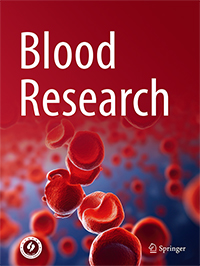Original Article
 Split Viewer
Split Viewer
Blood Res 2020; 55(1):
Published online March 31, 2020
https://doi.org/10.5045/br.2020.55.1.44
© The Korean Society of Hematology
Thromboprophylaxis after bariatric surgery
Correspondence to : Feras M. Almarshad, M.D.
Department of Internal Medicine, College of Medicine, Shaqra University, Shaqra 11961, Saudi Arabia
E-mail: feras-mmm@hotmail.com
This is an Open Access article distributed under the terms of the Creative Commons Attribution Non-Commercial License (http://creativecommons.org/licenses/by-nc/4.0) which permits unrestricted non-commercial use, distribution, and reproduction in any medium, provided the original work is properly cited.
Background
Venous thromboembolism (VTE), which includes deep vein thrombosis (DVT) and pulmonary embolism (PE), is a known cause of morbidity and mortality after bariatric surgery. However, the data concerning appropriate thromboprophylaxis after bariatric surgery is uncertain. The objective of this study was to evaluate the efficacy and safety of extended duration thromboprophylaxis in post-bariatric surgery patients.
Methods
We conducted a retrospective study of consecutive patients who underwent bariatric surgery from November 2014 to October 2018 at King Fahad General Hospital in Jeddah, Saudi Arabia. All included patients were treated with extended duration thromboprophylaxis.
Results
We identified 374 patients who underwent bariatric surgery during the study period. Of these, 312 patients (83%) were followed for at least 3 months. The most common type of surgery was a laparoscopic sleeve gastrectomy (N=357) and the median weight was 110 kg. The cumulative incidence of symptomatic postoperative VTE at 3 months was 0.64% (95% confidence interval, 0.20?1.52). All events occurred after hospital discharge. The most commonly used pharmacological prophylaxis (91%) for VTE prevention after bariatric surgery was enoxaparin 40 mg subcutaneously twice daily for 10?14 days after hospital discharge. There were no reported cases of bleeding or VTE related mortality after 3 months.
Conclusion
Extended thromboprophylaxis after bariatric surgery appears to be an effective and safe strategy for VTE prevention. Large prospective studies are needed to evaluate the optimal thromboprophylaxis regimen after bariatric surgery.
Keywords Bariatric surgery, Venous thromboembolism, Deep vein thrombosis, Pulmonary embolism, Thromboprophylaxis
Article
Original Article
Blood Res 2020; 55(1): 44-48
Published online March 31, 2020 https://doi.org/10.5045/br.2020.55.1.44
Copyright © The Korean Society of Hematology.
Thromboprophylaxis after bariatric surgery
Feras M. Almarshad1, Mosaad Almegren2, Turki Alshuaibi3, Nadiah Alobaodi3, Ali Almutawa3, Hajer Basunbl3, Farjah AlGahtani4, Bader Al Rawahi5
1Department of Internal Medicine, College of Medicine, Shaqra University, Shaqra, 2College of Medicine, Al Imam Mohammad Ibn Saud Islamic University, Riyadh, 3Department of Medicine, King Fahd Hospital, Jeddah, 4College of Medicine, King Saud University, Riyadh, Saudi Arabia, 5Sultan Qaboos University, Sultan Qaboos University Hospital, Oman
Correspondence to:Feras M. Almarshad, M.D.
Department of Internal Medicine, College of Medicine, Shaqra University, Shaqra 11961, Saudi Arabia
E-mail: feras-mmm@hotmail.com
This is an Open Access article distributed under the terms of the Creative Commons Attribution Non-Commercial License (http://creativecommons.org/licenses/by-nc/4.0) which permits unrestricted non-commercial use, distribution, and reproduction in any medium, provided the original work is properly cited.
Abstract
Background
Venous thromboembolism (VTE), which includes deep vein thrombosis (DVT) and pulmonary embolism (PE), is a known cause of morbidity and mortality after bariatric surgery. However, the data concerning appropriate thromboprophylaxis after bariatric surgery is uncertain. The objective of this study was to evaluate the efficacy and safety of extended duration thromboprophylaxis in post-bariatric surgery patients.
Methods
We conducted a retrospective study of consecutive patients who underwent bariatric surgery from November 2014 to October 2018 at King Fahad General Hospital in Jeddah, Saudi Arabia. All included patients were treated with extended duration thromboprophylaxis.
Results
We identified 374 patients who underwent bariatric surgery during the study period. Of these, 312 patients (83%) were followed for at least 3 months. The most common type of surgery was a laparoscopic sleeve gastrectomy (N=357) and the median weight was 110 kg. The cumulative incidence of symptomatic postoperative VTE at 3 months was 0.64% (95% confidence interval, 0.20?1.52). All events occurred after hospital discharge. The most commonly used pharmacological prophylaxis (91%) for VTE prevention after bariatric surgery was enoxaparin 40 mg subcutaneously twice daily for 10?14 days after hospital discharge. There were no reported cases of bleeding or VTE related mortality after 3 months.
Conclusion
Extended thromboprophylaxis after bariatric surgery appears to be an effective and safe strategy for VTE prevention. Large prospective studies are needed to evaluate the optimal thromboprophylaxis regimen after bariatric surgery.
Keywords: Bariatric surgery, Venous thromboembolism, Deep vein thrombosis, Pulmonary embolism, Thromboprophylaxis
-
Demographic data and clinical characteristics. .
-
Venous thromboembolism events after bariatric surgery. .

Article Tools
Stats or Metrics
Related articles in BR
-
Updated recommendations for the treatment of venous thromboembolism
Junshik Hong, Seo-Yeon Ahn, Yoo Jin Lee, Ji Hyun Lee, Jung Woo Han, Kyoung Ha Kim, Ho-Young Yhim, Seung-Hyun Nam, Hee-Jin Kim, Jaewoo Song, Sung-Hyun Kim, Soo-Mee Bang, Jin Seok Kim, Yeung-Chul Mun, Sung Hwa Bae, Hyun Kyung Kim, Seongsoo Jang, Rojin Park, Hyoung Soo Choi, Inho Kim, Doyeun Oh; on behalf of the Korean Society of Hematology Thrombosis and Hemostasis Working Party
Blood Res 2021; 56(1): 6-16 -
New cut-off point for D-dimer in the diagnosis of pulmonary embolism during pregnancy
Somayeh Sadeghi, Marjan Golshani, Bahareh Safaeian
Blood Res 2021; 56(3): 150-155 -
Recent advances in the management of venous thromboembolism
Walter Ageno
Korean J Hematol 2010; 45(1): 8-13




 PDF
PDF Standard view
Standard view Export citation
Export citation Share
Share  Previous Article
Previous Article



